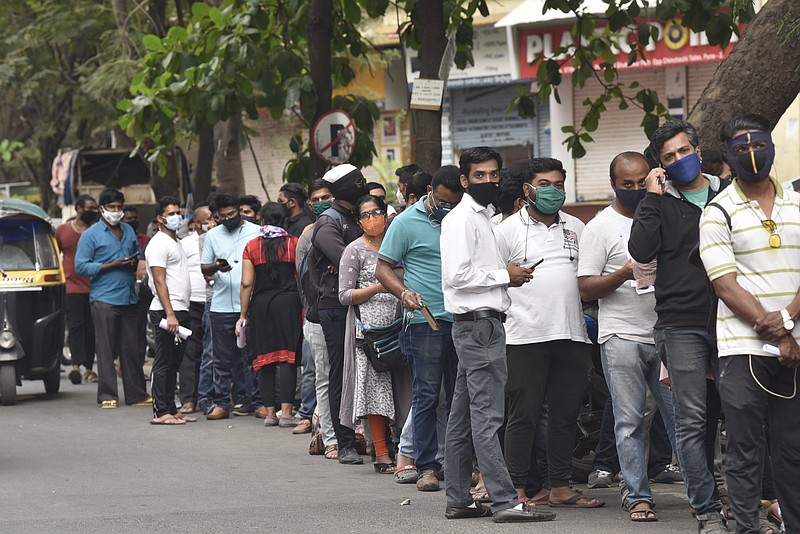NEW DELHI (AP) - The Indian city of Pune is running out of ventilators as gasping coronavirus patients crowd its hospitals. Social media is full of people searching for beds, while relatives throng pharmacies looking for antiviral medicines that hospitals ran out of long ago.
The surge, which can be seen across India, is particularly alarming because the country is a major vaccine producer and a critical supplier to the U.N.-backed COVAX initiative. That program aims to bring shots to some of the world's poorest countries. Already the rise in cases has forced India to focus on satisfying its domestic demand - and delay deliveries to COVAX and elsewhere, including the United Kingdom and Canada.
India said Tuesday it would authorize a slew of new vaccines, but experts said the decision was unlikely to have any immediate impact on supplies available in the country. For now, its focus on domestic needs "means there is very little, if anything, left for COVAX and everybody else," said Brook Baker, a vaccines expert at Northeastern University.
Pune is India's hardest-hit city, but other major metropolises are also in crisis, as daily new infections hit record levels, and experts said missteps stemming from the belief the pandemic was "over" are coming back to haunt the country.
When infections began plummeting in India in September, many concluded the worst had passed. Masks and social distancing were abandoned, while the government gave mixed signals about the level of risk. When cases began rising again in February, authorities were left scrambling.
"Nobody took a long-term view of the pandemic," said Dr. Vineeta Bal, who studies immune systems at the city's Indian Institute of Science Education and Research. She noted, for instance, that instead of strengthening existing hospitals, temporary sites were created. In Pune, authorities are resurrecting one of those makeshift facilities, which was crucial to the city's fight against the virus last year.
India is not alone. Many countries in Europe that saw declines in cases are experiencing new surges, and infection rates have been climbing in every global region, partially driven by new virus variants.
Over the past week, India had averaged more than 143,000 cases per day. It has now reported 13.6 million virus cases since the pandemic began - pushing its toll past Brazil's and making it second only to the United States', though both countries have much smaller populations. Deaths are also rising and have crossed the 170,000 mark. Even those figures, experts said, are likely an undercount.
Nearly all states are showing an uptick in infections, and Pune - home to 4 million people - is now left with just 28 unused ventilators Monday night for its more than 110,000 COVID-19 patients.
The country now faces the mammoth challenge of vaccinating millions of people, while also contact-tracing the tens of thousands getting infected every day and keeping the health system from collapsing.
Dilnaz Boga has been in and out of hospitals in recent months to visit a sick relative and witnessed the shift firsthand as cases began to rise. Beds were suddenly unavailable. Nurses warned visitors to be careful. Posters that advised proper mask-wearing sprang up everywhere.
And then, earlier this month, Boga and her 80-year-old mother tested positive. Doctors suggested her mother be hospitalized, but there weren't any beds available initially. She and her mother are now recovering.
Compounding concerns about rising cases is the fact the country's vaccination drive could also be headed for trouble: Several Indian states have reported a shortage of doses even as the federal government has insisted there's enough in stock.
After a sluggish start, India recently overtook the United States in the number of shots it's giving every day and is now averaging 3.6 million. However, with more than four times the number of people and that later start, it has given at least one dose to around just 7 percent of its population.
India's western Maharashtra state, home to Pune and financial capital Mumbai, has recorded nearly half of the country's new infections in the past week. Some vaccination centers in the state turned away people due to shortages.
At least half a dozen Indian states are reporting similarly low stocks, but Health Minister Harsh Vardhan has called these concerns "deplorable attempts by some state governments to distract attention from their failures."
Still, India moved Tuesday to expand the number of vaccines available by authorizing the use of all coronavirus shots that have been given an emergency nod by the World Health Organization or regulators in the United States, Europe, Britain or Japan. Indian regulators also OK'd Russia's Sputnik V for emergency use.

